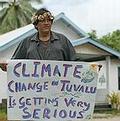 氣候變遷對人類健康的影響,將列為世界衛生組織(WHO)首要的研究課題之一!全球衛生專家在西班牙衛生部舉行一場為期三天的WHO會議,會後專家們達成上述決議。
氣候變遷對人類健康的影響,將列為世界衛生組織(WHO)首要的研究課題之一!全球衛生專家在西班牙衛生部舉行一場為期三天的WHO會議,會後專家們達成上述決議。
西班牙衛生與消費部長索利亞(Bernat Soria)表示:「這次會議闡明,要避免氣候變遷衝擊人類健康,我們有必要強化研究的證據。我們十分歡迎這項計畫,它規劃出清楚明瞭的研究議程,也強調所有國家都需要以事實證據為本位的決策。」
這項計畫宗旨在驅策、聚焦並強化氣候變遷與衛生的研究,來加強2009年12月哥本哈根聯合國氣候會議中研討所需的論證基礎──在2009年的會議上,世界領袖將促成一項延續京都議定書的新全球氣候協議。
這項研究計畫,由WHO與超過80名氣候變遷與衛生研究專家、贊助單位及其他聯合國組織代表等,共同合作進行;接下來首要的基礎工作,即是在全面回顧有關氣候變遷造成健康風險的文獻。
WHO總幹事陳馮富珍表示:「包括WHO在內的大部分機構,都強調過氣候變遷帶來的健康威脅,WHO的193個會員國也向我們尋求事實證據來幫助強化他們的決策,這項計畫正能提供它們所需。」
過去十年,即使氣候變遷加劇的程度已經讓人類意識到嚴重的危機,但是對健康的影響卻沒有受到多少研究上的關注。
氣候變遷與健康的影響關聯的科研論文數量,僅是研究空氣汙染影響的八分之一,甚至吸菸影響的相關研究還多出40倍。
而今WHO的研究計畫規劃出5項優先研究領域,首項是地球暖化與其他健康因素的影響和趨勢之間的關聯。
 氣候變遷對健康的近程影響已廣為人知,然而未來長期變化所產生的效應仍亟待分析標定。例如現在許多國家已經開始採取各種方法來處理與氣候變遷相關的健康威脅,如熱浪與水患。而研究專家將比較不同方法做評估,有助於評定這些處理策略的效能。
氣候變遷對健康的近程影響已廣為人知,然而未來長期變化所產生的效應仍亟待分析標定。例如現在許多國家已經開始採取各種方法來處理與氣候變遷相關的健康威脅,如熱浪與水患。而研究專家將比較不同方法做評估,有助於評定這些處理策略的效能。
這次與會者也都贊同,我們更需要的是,立即評估針對氣候變遷的預防與調適政策所可能導致的健康隱憂,而不僅是氣候變遷對健康的影響。
最後,研究專家將考察公共衛生系統針對氣候變遷對健康影響所作的各種強化措施。大部份的衛生體系僅以基本的公共衛生問題來處理氣候變遷,但是WHO呼籲,我們亟需以更多專業知識定出最佳方法,如此,針對氣候變遷相關威脅以及大環境下所有健康危機所制定的整體預防性的公共衛生策略,才能有效實行。
World health experts will document the human health effects of climate change under a new high priority research agenda agreed Wednesday at the end of a three-day meeting here convened by the World Health Organization and hosted by Spain's Ministry of Health.
"This meeting has made clear that there is a need to enhance our evidence base on ways to protect health from climate change," said Dr. Bernat Soria, Spain's minister of health and consumption. "We welcome this plan which sets out a clear research agenda and addresses all countries' needs for evidence-based policy making."
The plan is intended to speed up, focus and intensify climate change and health research to strengthen the evidence base for discussion at the UN climate conference in Copenhagen in December 2009, where world leaders will forge a new global climate agreement to succeed the Kyoto Protocol.
Developed by WHO with more than 80 researchers on climate change and health, representatives of donors and other UN agencies, the plan builds on a comprehensive review of what is already known about health risks from climate change.
"Many agencies, including WHO, have highlighted the health dangers of climate change," said Dr. Margaret Chan, WHO's director-general. "Our 193 member states asked WHO to help them strengthen the evidence base for policy action. This plan provides the framework for doing just that."
In the last decade, even though climate change has been increasingly acknowledged as an important risk to human well-being, its effects on health have received little research attention.
Scientific papers describing the links between climate change and health are outnumbered by those on air pollution by almost eight times, and by those on smoking by almost 40 times.
The WHO research plan identifies five priority research areas starting with interactions between the planet's rising temperature and other health determinants and trends.
Much is known of short-term health impacts of climate change, but there is a need for better characterization of the effects of long-term changes.
Different countries have taken a variety of approaches to deal with climate change-related health threats such as heatwaves and floods. The researchers will conduct comparative outcome assessments to help rank the effectiveness of these interventions.
Participants at the Madrid meeting agreed on the urgent need for rapid assessment of the health implications of specific climate change prevention and adaptation policies in sectors other than health.
Finally, researchers will investigate ways of strengthening public health systems to address the health effects of climate change.
Most health system interventions to deal with climate change build on basic public health competencies, but WHO says more knowledge is needed to identify the best ways to implement integrated preventive public health strategies that reduce not just climate change related threats but all environmental health risks.
全文及圖片詳見:ENS

